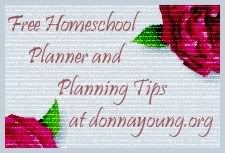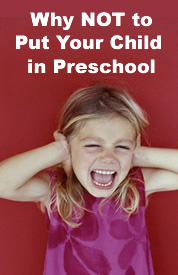The Truth About Early Academics
Posted by homeschoolmentormom on February 6, 2010
Until the last 40 years or so, most children weren’t introduced to the alphabet (in a formal lesson type of way) until Kindergarten. Nowadays, many children are taught the alphabet in preschool—or even before (as toddlers.) The end result has not been encouraging: The more the public schools demand of young children, the worse America’s children do—academically and otherwise. More and more children are being diagnosed with learning disorders; many developmental experts believe this is due to the “push down” in curriculum combined with a lack of time for play and other more traditional preschool-type activities. Why would we, as homepreschoolers, want to follow that model?
Perhaps we’ve only heard one side of the argument.
The truth is, not one single study that has shown that early academics are beneficial to young children. There is no proof that learning to read earlier is better than learning later. However, there is considerable proof that early academics can cause harm. But don’t take my word for it; read the articles below for yourself. They are worth your time.
Resources about Readiness:
“Moving up the Grades: Relationship between Preschool Model and Later School Success”, by Rebecca A. Marcon, University of North Florida
Important points: “Children whose preschool experience was child initiated faired better than peers in the transition from the primary to the later elementary school grades. Not only were their overall grades following the transition significantly higher, their school performance improved or held constant in all but two subject areas (music, social studies) despite increased academic demands of the next grade level.….By the end of their sixth year in school, children whose preschool experiences had been academically directed earned significantly lower grades compared to children who had attended child-initiated preschool classes. Children’s later school success appears to have been enhanced by more active, child-initiated early learning experiences. Their progress may have been slowed by overly academic preschool experiences that introduced formalized learning experiences too early for most children’s developmental status.” Read the entire article HERE.
“Academics, Literacy, and Young Children,” Childhood Education, Spring 2000, by Elizabeth M. Nel:
Important points: “According to Elkind (1987), academic learning fueled by motivation other than the child’s innate interests constitutes miseducation. It puts a child at risk for psychological damage (Werner & Strother, 1987); what is worse, it is apparently for no good reason, since the benefits of early reading instruction are relatively insignificant.
…Therefore, with respect to literacy, developmentally appropriate preschool academics do not involve formal reading instruction, but rather they promote print awareness (Kontos, 1986) by exposing young children to letters, words, and numbers in meaningful contexts (Lesiak, 1997).
…Reading to children is one of the best ways to model literacy skills (Bus, Van Ijzendoorn, & Pellegrini, 1995). Reading should not be limited to a set storytime, but rather should be shared with children throughout the day.” Read the entire article HERE.
“Rush Little Baby: How the Push for Infant Academics Might Actually be a Waste of Time-or Worse”, by By Neil Swidey, October 28, 2007, The Boston Globe
(Watch the video, then scroll down for the article. It’s long, but worth the time; and it’s not only about infants.)
Important points: “A classic study in the 1930s by noted researcher and Illinois educator Carleton Washburne compared the trajectories of children who had begun reading at several ages, up to 7. Washburne concluded that, in general, a child could best learn to read beginning around the age of 6. By middle school, he found no appreciable difference in reading levels between the kids who had started young versus the kids who had started later, except the earlier readers appeared to be less motivated and less excited about reading.
…‘Many efforts to teach a child to read before 4 or 5 years of age are biologically precipitate and potentially counterproductive for many children.’ The danger in pushing reading too early, Wolf says, is that, for many children, we may be asking them to do something for which their brains are not ready. “You run the risk of making a child feel like a failure before they’ve even begun,” she says. And while the gains from early reading may fade away, the damage from being tagged a slow kid at a young age has the potential to be permanent.
…..Study after study shows the best thing parents can do for their children is give them a nurturing, rich, vibrant environment, reading to them often and exposing them to lots of language in organic ways. Reading books out loud is most effective when the parent uses the words on the page to help the child make connections to his or her own world.
…As long as parents are exposing their children to a nurturing, vibrant environment, reading to them regularly, and speaking with them intelligently, they should feel free to put the flash cards away.”
Read the entire article HERE.
Relax and enjoy the preschool years! Follow your children’s lead when it comes to early academics! Watch your children for signs of interest and natural learning, so that you neither push nor hold them back. Find the balance.
© 2010 Susan Lemons all rights reserved.






silvia said
Very well written, Susan. I believe we demand too much academically and unnecessarily while we don’t ‘demand’ the discipline from children they are perfectly capable of giving us.
I’ve seen another problem out there, specially when I see blogs from hs’ing families in Spain or places where there is not a Biblical reason for educating children, or they don’t have the luxury many have here of having lots of other families who do the same around, and where laws are mostly beneficial.
What I see it’s parents trying to PROVE themselves they are doing good, and they prove it by showing they do more, earlier, and excelling.
I have to admit that the thought of being considered ‘relaxed, or unorganized, without a “proper schedule” and the like’ haunted me and it’s a daily conquer, but thanks to you and authors like Mrs. Beechick, etc. I’m wining that battle 😉 So I’m here on the front to combat that trend.
silvia
homeschoolmentormom said
Wow, what a gifted little girl! I’m glad you aren’t pushing, but still enjoying the traditional preschool/Kindergarten type activities with her. So many families overlook play, art, music, and storytime once their children begin to read. She still needs those activities to help her continue to gain motor control, and to develop that base of basic knowledge about the world.
I’m amazed that you pediatrician recomended homeschooling! I think he is right; she would be bored in a classroom. The key with advanced children is to do just what you’ve been doing-using a balanced approach, letting her move ahead in the areas where she shows interest/ability, while at the same time, providing those age appropriate activiites she still needs and enjoys.
I hope you stay well, and enjoy your time with her!
Blessings,
Susan
PS. If you like my blog, please add me to your blog roll or consider linking to me! Thanks.
sharon said
Hi Susan,
You made a good point in bringing this up! In Asia where I live, everything moves so fast. We are known to be a very efficient nation. We send kids to playgroup as early as 2yrs old and almost everyone starts nursery at 3yrs old. This is a dual income society and sadly, there is very little focus on what what the child really needs. Time for real quantity and quality relationship. This seems like a very ‘westernised” thought for many of us who are used to live among people who push ourselves harder and faster to achieve.
The society has learned to ‘follow what others do’ with little insights. I just saw your preview on homeschool & beyond and its excellent that we try to get that message out as much as possible.
honestly, I am reminded by the times where I had to scale down what I teach or do so that I can spend as much time in real conversations, building a relationship and making time I spend with my children the key thing in my homepreschool environment! Thanks!
ps: by the way, those key findings are a great resource that I am going this pg on my blog. Hope that’s ok with you!
homeschoolmentormom said
Of course, and thanks! Remember, if you post about my book/the contest and add me to your blog roll, let me know and you’ll be in the contest to ear a book for free.
Blessings,
Susan